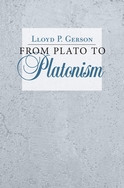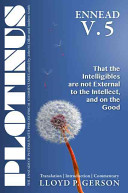 Congratulations to Lloyd Gerson on the publication of his new book From Plato to Platonism. To quote from the publisher’s description: “Was Plato a Platonist? While ancient disciples of Plato would have answered this question in the affirmative, modern scholars have generally denied that Plato’s own philosophy was in substantial agreement with that of the Platonists of succeeding centuries. In From Plato to Platonism, Lloyd P. Gerson argues that the ancients were correct in their assessment. He arrives at this conclusion in an especially ingenious manner, challenging fundamental assumptions about how Plato’s teachings have come to be understood. Through deft readings of the philosophical principles found in Plato’s dialogues and in the Platonic tradition beginning with Aristotle, he shows that Platonism, broadly conceived, is the polar opposite of naturalism and that the history of philosophy from Plato until the seventeenth century was the history of various efforts to find the most consistent and complete version of ‘anti-naturalism’.”
Congratulations to Lloyd Gerson on the publication of his new book From Plato to Platonism. To quote from the publisher’s description: “Was Plato a Platonist? While ancient disciples of Plato would have answered this question in the affirmative, modern scholars have generally denied that Plato’s own philosophy was in substantial agreement with that of the Platonists of succeeding centuries. In From Plato to Platonism, Lloyd P. Gerson argues that the ancients were correct in their assessment. He arrives at this conclusion in an especially ingenious manner, challenging fundamental assumptions about how Plato’s teachings have come to be understood. Through deft readings of the philosophical principles found in Plato’s dialogues and in the Platonic tradition beginning with Aristotle, he shows that Platonism, broadly conceived, is the polar opposite of naturalism and that the history of philosophy from Plato until the seventeenth century was the history of various efforts to find the most consistent and complete version of ‘anti-naturalism’.”
 Congratulations to our colleague Lloyd Gerson who just published a new translation of Plotinus’ Ennead V.5. Here’s an excerpt from the book cover: “Platonists beginning in the Old Academy itself and up to and including Plotinus struggled to understand and articulate the relation between Plato’s Demiurge and the Living Animal which served as the model for creation. The central question is whether “contents” of the Living Animal, the Forms, are internal to the mind of the Demiurge or external and independent. For Plotinus, the solution depends heavily on how the Intellect that is the Demiurge and the Forms or intelligibles are to be understood in relation to the first principle of all, the One or the Good. The treatise V.5 [32] sets out the case for the internality of Forms and argues for the necessary existence of an absolutely simple and transcendent first principle of all, the One or the Good. Not only Intellect and the Forms, but everything else depends on this principle for their being.”
Congratulations to our colleague Lloyd Gerson who just published a new translation of Plotinus’ Ennead V.5. Here’s an excerpt from the book cover: “Platonists beginning in the Old Academy itself and up to and including Plotinus struggled to understand and articulate the relation between Plato’s Demiurge and the Living Animal which served as the model for creation. The central question is whether “contents” of the Living Animal, the Forms, are internal to the mind of the Demiurge or external and independent. For Plotinus, the solution depends heavily on how the Intellect that is the Demiurge and the Forms or intelligibles are to be understood in relation to the first principle of all, the One or the Good. The treatise V.5 [32] sets out the case for the internality of Forms and argues for the necessary existence of an absolutely simple and transcendent first principle of all, the One or the Good. Not only Intellect and the Forms, but everything else depends on this principle for their being.”
LOGOS, EROS, AND PLEASURE:
THE SHAPING OF MORAL MOTIVATION
Sixth Annual Toronto Workshop in Ancient Philosophy
March 21-22, 2014
Jackman Humanities Building 418
Friday
3:30 – 5:15 “First chop your Logos”
M. M. McCabe (Kings College, London)
Commentator: Dan Ioppolo (Toronto)
Coffee break
5:45 – 7:30 “Aristophanic Tragedy in Plato’s Symposium”
Suzanne Obrdzalek (Claremont McKenna)
Commentator: Franco Trivigno (Marquette)
Saturday
9:00 – 9:50 “From the Symposium to the Laws: Why Eros matters for Plato”
Frisbee Sheffield (Cambridge)
9:55 – 10:45 “Plato on Erôs and Conversion”
Jacob Stump (Toronto)
Coffee break
11:10 – 12:30 Comments on Sheffield and Stump
Tom Tuozzo (University of Kansas)
Lunch (on site)
1:40 – 3:25 “To Know You is to Love You? Plato, Forms, and Moral Motivation”
Iakovos Vasiliou (CUNY Graduate Centre)
Commentator: Rachana Kamtekar (Arizona)
Coffee break
3:45 – 5:30 “Epicurean Motivation”
Larkin Philpot (Toronto)
Commentator: Phillip Mitsis (NYU)
Coffee break
5:50 – 7:35 “Locke on Pleasure and Law as Motives”
Phillip Mitsis (NYU)
Commentator: Jacob Klein (Colgate)
Registration is mandatory! Please contact Dan Ioppolo.
 Congratulations to Lloyd Gerson on the publication of his new book From Plato to Platonism. To quote from the publisher’s description: “Was Plato a Platonist? While ancient disciples of Plato would have answered this question in the affirmative, modern scholars have generally denied that Plato’s own philosophy was in substantial agreement with that of the Platonists of succeeding centuries. In From Plato to Platonism, Lloyd P. Gerson argues that the ancients were correct in their assessment. He arrives at this conclusion in an especially ingenious manner, challenging fundamental assumptions about how Plato’s teachings have come to be understood. Through deft readings of the philosophical principles found in Plato’s dialogues and in the Platonic tradition beginning with Aristotle, he shows that Platonism, broadly conceived, is the polar opposite of naturalism and that the history of philosophy from Plato until the seventeenth century was the history of various efforts to find the most consistent and complete version of ‘anti-naturalism’.”
Congratulations to Lloyd Gerson on the publication of his new book From Plato to Platonism. To quote from the publisher’s description: “Was Plato a Platonist? While ancient disciples of Plato would have answered this question in the affirmative, modern scholars have generally denied that Plato’s own philosophy was in substantial agreement with that of the Platonists of succeeding centuries. In From Plato to Platonism, Lloyd P. Gerson argues that the ancients were correct in their assessment. He arrives at this conclusion in an especially ingenious manner, challenging fundamental assumptions about how Plato’s teachings have come to be understood. Through deft readings of the philosophical principles found in Plato’s dialogues and in the Platonic tradition beginning with Aristotle, he shows that Platonism, broadly conceived, is the polar opposite of naturalism and that the history of philosophy from Plato until the seventeenth century was the history of various efforts to find the most consistent and complete version of ‘anti-naturalism’.”
 Congratulations to our colleague Lloyd Gerson who just published a new translation of Plotinus’ Ennead V.5. Here’s an excerpt from the book cover: “Platonists beginning in the Old Academy itself and up to and including Plotinus struggled to understand and articulate the relation between Plato’s Demiurge and the Living Animal which served as the model for creation. The central question is whether “contents” of the Living Animal, the Forms, are internal to the mind of the Demiurge or external and independent. For Plotinus, the solution depends heavily on how the Intellect that is the Demiurge and the Forms or intelligibles are to be understood in relation to the first principle of all, the One or the Good. The treatise V.5 [32] sets out the case for the internality of Forms and argues for the necessary existence of an absolutely simple and transcendent first principle of all, the One or the Good. Not only Intellect and the Forms, but everything else depends on this principle for their being.”
Congratulations to our colleague Lloyd Gerson who just published a new translation of Plotinus’ Ennead V.5. Here’s an excerpt from the book cover: “Platonists beginning in the Old Academy itself and up to and including Plotinus struggled to understand and articulate the relation between Plato’s Demiurge and the Living Animal which served as the model for creation. The central question is whether “contents” of the Living Animal, the Forms, are internal to the mind of the Demiurge or external and independent. For Plotinus, the solution depends heavily on how the Intellect that is the Demiurge and the Forms or intelligibles are to be understood in relation to the first principle of all, the One or the Good. The treatise V.5 [32] sets out the case for the internality of Forms and argues for the necessary existence of an absolutely simple and transcendent first principle of all, the One or the Good. Not only Intellect and the Forms, but everything else depends on this principle for their being.”